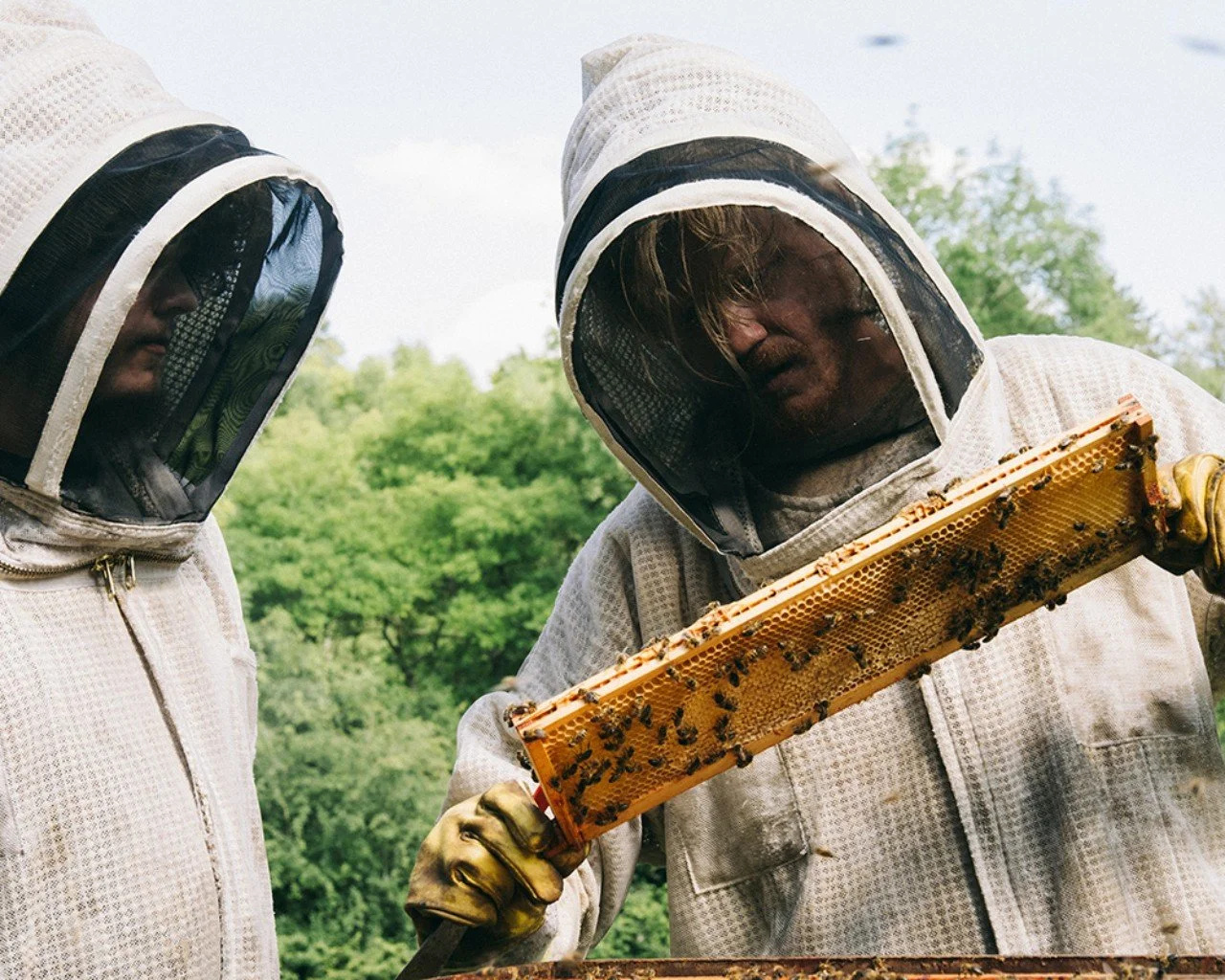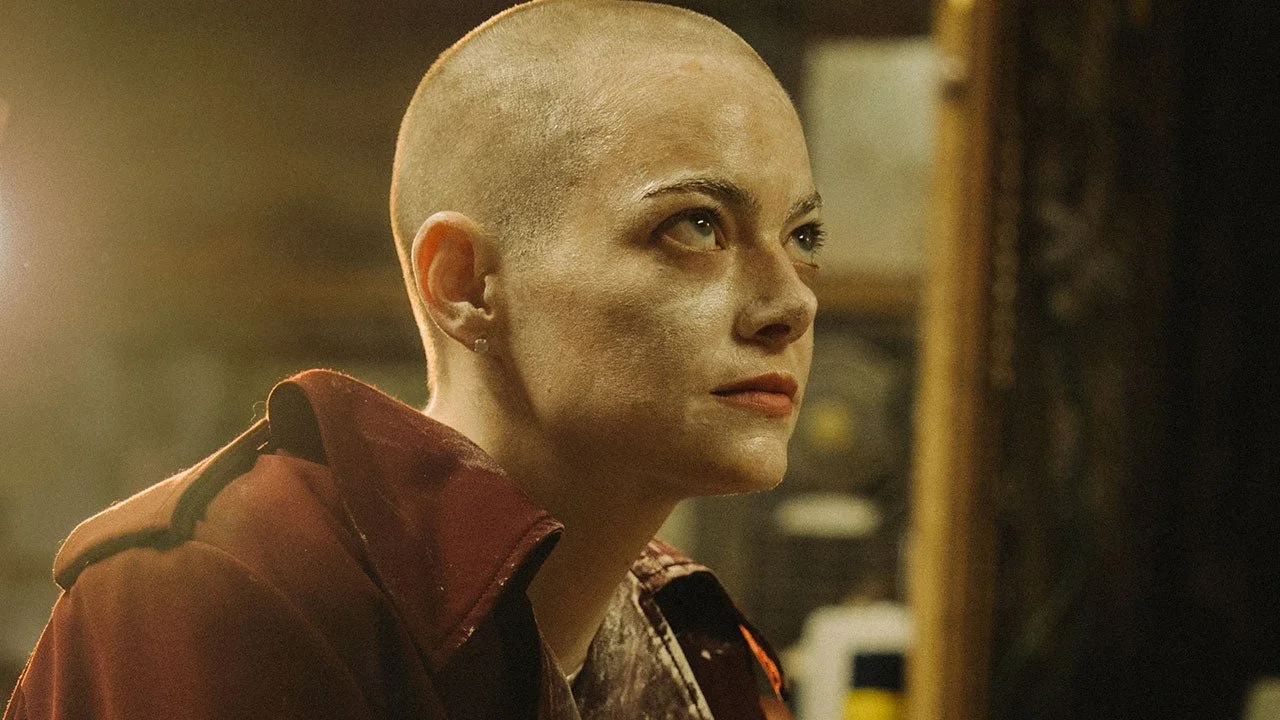In the Hive of Lanthimos’ Cynicism: The Inevitable Cycle of Bugonia (2025)
Staff Writer Kyle Ashley Pillai tracks the cycles, cynicism, and beauty of decay in his review of Yorgos Lanthimos’ latest work.
This review contains spoiler.
“It all starts with a flower.”
Pollination, production, death. Repeat.
There always seems to be a postmodern cynicism that permeates throughout Yorgos Lanthimos’ work. Bugonia is no exception, following the same absurd narrative structures that has made the director such an acclaimed figure amongst cinephiles.
Although the film is adapted from the 2003 South Korean film Save the Green Planet, it definitely feels like a distinctly modern reinterpretation, akin to the milieu of contemporary America. It follows two conspiracy obsessed cousins: Teddy (Jesse Plemmons) and Don (Aidan Delbis), in their attempt to kidnap Michelle (Emma Stone), the CEO of a high profile pharmaceutical corporation, Auxolith. The reason being that the two cousins are convinced that Michelle is an alien. Ostensibly, it seems Lanthimos took the second mini-story of his triptych fable Kinds of Kindness — where an alarmed Jesse Plemmons believes that his wife, Emma Stone, is an imposter after she returns from sea a completely different person — and turned it into a full length feature. But the two are dissimilar thematically.
While Kinds of Kindness had spades of mystique and perplexing absurdity, Bugonia is more akin to the social provocations of Lanthimos’ previous work, The Lobster. This is no surprise, considering the script was penned by Will Tracy (of The Menu, Succession), whose work tends to contain overt satirical social commentaries, whether it be the snobbish, highbrow culture, or the late-stage capitalist alienation. It’s also produced by Ari Aster (Hereditary, Midsommar), who himself is known all too well for his pessimistic cynicism, especially in his recent works like Beau is Afraid and Eddington.
The broad strokes of Teddy are the most on-the-nose depiction you can get of right-wing conspiracy theorists. He’s in a persistent state of denial — he believes his bees are dying because the state has poisoned the food chain, with Michelle at the heart of it. Teddy believes that the earth is under the control of Andromedans. Early in the film, he promotes the use of a drug which he rids the two cousins of their libido to focus on their objective, an effect he calls “chemical castration”. Yeah, sounds like that meme of the ‘males only’ facility in Bali where men focus on their goals with no women around. It’s the most homoerotic, ‘alpha’ thing you can find on the internet, but that’s exactly what Teddy’s character feels like. Teddy is completely and utterly out of touch with reality. The application of antihistamine cream on Michelle’s body as a blocker from alien communication, shaving her head, the list goes on.
However, there’s a layer of sympathy to be felt for Teddy as well. Yes, his actions are completely ludicrous and misguided. But he remains a compelling lead as we sympathise with the circumstances of his mental degradation into conspiracy. There’s a pervading sense of loneliness and emotional trauma. Teddy’s opioid addicted mother, Sandy (Alicia Silverstone), had been the guinea pig for Auxolith’s experimental drug, leaving her in a comatose state, resulting in a subtle malaise that haunts Teddy. In typical Lanthimos offbeat fashion, Teddy hoists his mother up like she’s a balloon, and she levitates as her body is poked and prodded with countless needles. It’s a surreal set of images, representative of a childlike, anticipatory grief that informs Teddy’s character. He’s unable to let go of the guilt and despair of her condition, as Sandy lingers in that midway point towards death. Her shadow consistently looms over him. Teddy subconsciously blames these horrifying past circumstances, and they inform his future actions.
The film’s unsettling tension pulls you deeper in; Lanthimos is clearly having the time of his life behind the camera. Sudden bursts of overbearing string instruments and keening synths interrupt seemingly mundane moments, amplifying the film’s warped psychological space. It’s a juxtaposition that highlights Teddy’s warped sense of grief, and thereby bears this heavy burden on his shoulders to save humanity, or so he portrays himself. In reality, it’s disturbing as the audience watches Teddy descend further into his deluded basement fantasises.
Even simple conversations feel off-kilter: Lanthimos frequently shoots them at oblique angles, placing the lens low beneath the actors when Teddy converses with people, subtly underscoring his growing disconnect from the world around him. Teddy’s actions echo the “male loneliness epidemic” which plagues online discourse, and how it’s a toxic self-inflicted pressure to act stoic and self-reliant. He funnels his pain outward and blames his misfortunes on society at large.
Michelle, on the other hand, represents banal corporate communication. Every response, even in captivity, is rehearsed and professional. In a series of dining table conversations, Michelle reasons with Teddy, explaining the benefits Auxolith has reaped with its strides in drug technology. It’s worth noting the transactionality of corporate speech that the film deploys: test subjects like Sandy are treated as means to an end to further Auxolith’s corporate achievements, an idea Teddy is disagreeable to. Corporate communication has failed Teddy, in turn fuelling this toxic masculine rage. It results in him becoming more belligerent, his violent streak becoming more prominent.
Corporate apathy reaches its peak when Michelle informs Teddy that a bottle of antifreeze in her car is “Andromedan Antitode” that would cure his mother’s condition, a lie that results in Teddy killing his own mother in the hospital. At the same time, as Michelle attempts to escape Teddy’s basement, she stumbles across a hidden room, with jars of heads and organs on display. It turns out that Teddy had killed other individuals prior to Michelle in the name of “andromedan research”. On both opposing sides, the apathy begets violence in this cruel and sadistic world.
Up till this point, it seems as if Teddy has been nothing more than a clueless, right wing grifter. That is until there’s a rug pull that truly reveals the film’s intentions. Michelle is an alien, on a quest to rid humanity of their vice through her creation of experimental drugs, though she explains the more time she spent with humans, the more negative traits including cruelty and selfishness began to rub off on her. Teddy ends up being right, to a certain extent. There is something rotten in the world, though Teddy chooses sensationalism over the correct answer. Lanthimos doesn’t find himself aligning with Teddy’s misguided views, but rather a broader observation into the hidden artifice of humanity. Bugonia challenges audiences to revise their preconceived notions of its cast, revealing truths about human nature and our perception of the world. We’re all corrupt, and always end up harming ourselves with violence.
In the film’s final moments, Michelle, now in her andromedan ship, feels the inevitability in humanity’s own cyclical doom, making the executive decision to kill humanity. A montage of dead bodies prostrated over the ground is shown, while animals continue to roam the earth. It is an actualisation of the Greek ritual Bugonia, where bees are believed to spontaneously generate from the carcass of a sacrificed cow. In Grecian tradition, this symbolised the renewal of life and interconnectedness of nature, where the potential for new life is able to emerge from something corrupt. Lanthimos employs a similar notion, capturing the eternal beauty of natural life amidst human decay. Life will go on, in one way or another.
In the grand scheme of things, the generational failure of Bugonia is explored more cynically, at odds with another “film of the times” like One Battle After Another, a film which earnestly places hope in the future of humanity. Bugonia is more subdued, reconciling with the futility in making a totally peaceful world, but there’s a warped sense of beauty in the cycle. Despite our inherent flaws, life continues ticking on. Symbolically, Lanthimos gestures towards the idea of redefinition. In the creation of our own value systems, there must always be an opposing force (in this case aliens) to make our own definitions of the self come alive. He finds beauty in these opposing forces which we impose upon ourselves. It is this neverending cycle of redefinition and rebirth that brings us closer to being human.
Perhaps we’re all chained to this futile, cyclical doom. Violence is innate, death is inevitable. The process ends and begins all over again. Dinosaur fossils, bees buzzing.
It all starts with a flower.
Images in this article are being used under Fair Use guidelines as part of Singapore's Copyright Act 2021




